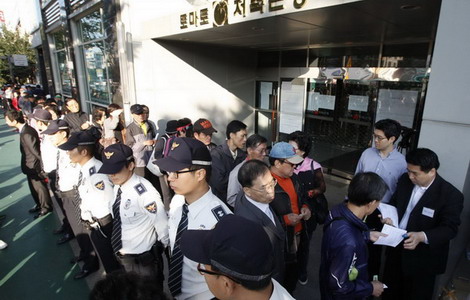China's healthcare more accessible
Updated: 2011-09-23 07:40
By Ariel Tung (China Daily)
|
|||||||||||
BOSTON - China's reform of its healthcare system has put it on the right path, Health Minister Chen Zhu told the Harvard America-China Health Summit in Boston on Wednesday.
The plan has lowered medical expenses for Chinese patients and has made healthcare more accessible, affordable and equitable, Chen said.
As part of the plan, the government has spent at least 850 billion yuan ($133.2 billion) to improve the healthcare system between 2009 and 2011, which had lowered the cost of essential medicines by at least 30 percent.
Chen also said the wide gap between health services in rural and urban areas is slowly closing and government subsidies for subscribers to the new rural medical plan are 10 times higher than subsidies in 2003.
China's reform of its healthcare system, dubbed "Healthy China 2020", began three years ago and aims to provide universal national health service.
"Healthy China 2020 is a crucial period of time for China's healthcare reform, a transition of many aspects of China's economy and society," Chen said.
In the last decade the government's share of total health expenditures has increased from 16 percent to 29 percent.
"This indicates the continuing government investment into health," Chen said. "I'm confident that over time, health equity will be met in China."
The inaugural summit, organized by the China Initiative of the Harvard School of Public Health, seeks to examine health reforms in China and the United States through dialogue between Chinese and American health policymakers, experts and leaders. About 600 people participated in the two-day event.
Like China, the US recently embarked on healthcare reform to provide medical coverage for an additional 32 million Americans by 2014.
The US may be the world's biggest healthcare spender, but it wants to learn from the Chinese experience, said Sherry Glied with the US Department of Health and Human Services.
The US and China have much to learn from one another's experiences and challenges, she said.
The summit takes place at a timely moment in global health, said Julio Frenk, dean of the Harvard School of Public Health and head of the Harvard School of Public Health China Initiative.
"Both China and the US are embarking on major health reform. China's health reform is one of the most observed in the world. We are at this historical moment where the world is searching for ways to finance healthcare and to combat diseases and malnutrition," Frenk said.
"China is a nation of complex problems but it also has great energy for innovation. This is probably the health reform that will not only benefit China but the rest of the world," Frenk said.
Jorge Dominguez, vice-provost for international affairs at Harvard University, said the summit is important for sustaining ties between Harvard and China.
"More than 200 Harvard faculty members told us they are having a significant collaboration or partnership with China," Dominguez said.
Hot Topics
Organ transplant bonds mother and son
Editor's Picks

|

|

|

|

|

|







